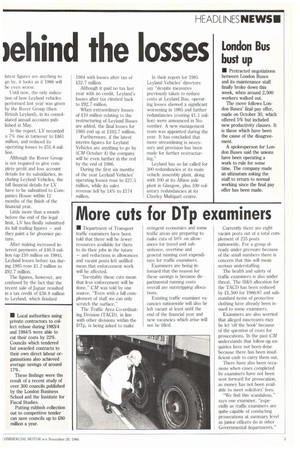More cuts for Dip examiners
Page 7

If you've noticed an error in this article please click here to report it so we can fix it.
• Department of Transport traffic examiners have been told that there will be fewer resources available for them to do their jobs in the future — and reductions in allowances and vacant posts left unfilled mean that enforcement work will be affected.
"Inevitably these cuts mean that less enforcement will be done," CM was told by one source. "Even with a full complement of staff we can only scratch the surface."
The Traffic Area Co-ordinating Division (TACD), in line with other divisions within the DTp, is being asked to make stringent economies and some traffic areas are preparing to make cuts of 10% on allowances for travel and subsistence, overtime and general running cost expenditure for traffic examiners.
Examiners are being informed that the reason for these savings is because departmental running costs overall are outstripping allocations.
Existing traffic examiner vacancies nationwide will also be left vacant at least until the end of the financial year and new vacancies which arise will not be filled. Currently there are eight vacant posts out of a total complement of 235 posts nationwide. For a group already under pressure because of the small numbers there is concern that this will mean serious understaffing.
The health and safety of traffic examiners is also under threat. The H&S allocation for the TAcD has been reduced by 21,500 for 1986/87 and substandard items of protective clothing have already been issued to some examiners.
Examiners are also worried that alleged miscreants may be let 'off the hook' because of the question of costs for prosecutions. In the past CM understands that follow-up enquiries have not been done because there has been insufficient cash to carry them out.
There have also been occasions when cases completed by examiners have not been sent forward for prosecution, as money has not been available to meet solicitors' fees.
"We find this scandalous," says one examiner, "especially as traffic examiners are quite capable of conducting prosecutions at summary level as junior officers do in other Governmental departments."
























































































































